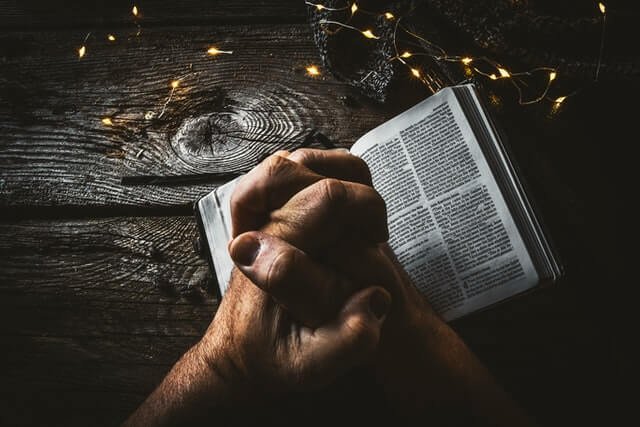Hebrews 11:1 (Survival)
“Now faith is the assurance of things hoped for, the conviction of things not seen” (Hebrews 11:1).
Most of us love survival shows on television. There’s just something about watching people attempt to conquer mother nature which grabs our attention and captivates our minds.
People always assume they possess the skills, physical abilities, and mental fortitude to survive in the wilderness alone. However, it doesn’t take too long before hunger pangs set in, harsh elements batter the body, and mind games wreak havoc that one thing is crystal clear.
Nature always wins!
Bottom-line, she’s undefeated. Mankind has never conquered her nor ever will, yet people continue venturing deep into the wilderness for days, weeks, months, and even years with dreams and aspirations of testing their physical and mental fortitude, come what may. The question is why? What are they trying to prove?
If we peel back the layers of the proverbial onion, it becomes abundantly clear why so many of us continue to test our luck and venture deep into the wilderness. We simply have an identity crisis and don’t know who we are anymore.
Therefore, we set out on a spiritual voyage of sorts, like Jack Sparrow in search of buried treasure, hoping to discover our true meaning and purpose in life by pushing our physical endurance to the limit and hoping we’ll find some answers along the way.
“Man puts an end to darkness and searches out to the farthest limit the ore in gloom and deep darkness” (Job 28:3).
ISOLATION:
Case in point: Have you ever watched a season of “Alone” on the History channel and wondered why most contestants seem to throw in the towel and give up? It wasn’t because they didn’t have adequate shelter to protect themselves from inclement weather and predators. Nor was it because they lacked fresh drinking water, struggled to keep fire alive, or even found dependable food sources to meet their physical needs.
They gave up simply because they lost hope.
Isolation broke them mentally to the point where they could no longer find a justifiable reason to continue. In other words, the physical pain was tolerable, but the reality of being cut off from civilization with no end in sight was simply too much to bear. They believed the lie that they were truly alone because all their attention was focused on horizontal relationships among mankind rather than vertical sufficiency in communion with their Creator.
It is incredibly easy to get lost in the wilderness of our minds when we’ve removed ourselves from civilization. The great prophet, Elijah, once suffered the same fate when he isolated himself in the wilderness after experiencing countless miracles. Despite all God had done in and through him, Elijah fell into deep depression because his focus was centered on his relationship with mankind instead of God.
“God has not rejected his people whom he foreknew. Do you not know what the Scripture says of Elijah, how he appeals to God against Israel? ‘Lord, they have killed your prophets, they have demolished your altars, and I alone am left, and they seek my life.’ But what is God’s reply to him? ‘I have kept for myself seven thousand men who have not bowed the knee to Baal’” (Romans 11:2–4).
God did not allow Elijah to remain self-focused, though, reminding him not by works of power and majesty but in the silence of a whisper that He was with him. Therefore, Elijah simply needed to shift his perspective off what he lacked in personal relationships and find peace, contentment, and sufficiency in the Lord alone.
“And he said, ‘Go out and stand on the mount before the LORD.’ And behold, the LORD passed by, and a great and strong wind tore the mountains and broke in pieces the rocks before the LORD, but the LORD was not in the wind. And after the wind an earthquake, but the LORD was not in the earthquake. And after the earthquake a fire, but the LORD was not in the fire. And after the fire the sound of a low whisper” (1 Kings 19:11–12).
MALNOURISHMENT:
Conventional wisdom says you can survive for three days without fresh drinking water and three weeks without food, yet countless souls live without spiritual nourishment every day of their lives, content to starve themselves rather than turn to faith in God for survival.
However, if our souls are eternal, wouldn’t we be better served ensuring our faith is well nourished since our bodies are mortal? Isn’t our eternal well-being far more important than our temporary, physical suffering?
As my friend, Creek Stewart, often quotes, “Survival is simple. Just don’t die!” Yet spiritually speaking, we choose death over life far too often when the solution to all our problems is virtually within our grasp if we’d open our hearts and tune our ears to hear God’s voice calling us home.
“The knowledge of God is the great hope of sinners. Oh, if you knew Him better, you would fly to Him! If you understood how gracious He is, you would seek Him. If you could have any idea of His holiness, you would loathe your self-righteousness. If you knew anything of His power, you would not venture to contend with Him. If you knew anything of His grace, you would not hesitate to yield yourself to Him.”
The problem is we so desperately want to prove our self-worth in this life that we’ll exhaust every tool, skill, and survival method at our disposal in hope of proving we could somehow save ourselves rather than ask for help. It’s a matter of pride if we’re honest enough to admit.
However, if we would open our eyes for one second, we’d realize God is patiently standing right before us with lifeline in hand, ready and willing to meet not only our physical needs, but our greater spiritual need of salvation as well.
“The Spirit of the Lord GOD is upon me, because the LORD has anointed me to bring good news to the poor; he has sent me to bind up the brokenhearted, to proclaim liberty to the captives, and the opening of the prison to those who are bound; to proclaim the year of the LORD’s favor, and the day of vengeance of our God; to comfort all who mourn” (Isaiah 61:1–2).
Consequently, there is no justifiable reason why we should starve ourselves in search of greater fulfillment outside of God. For just as King Solomon sought to find purpose and meaning in the things of this world, devoid of God, we too must come to the same conclusion Solomon did that God is the only true source of fulfillment we should be seeking.
“The end of the matter; all has been heard. Fear God and keep his commandments, for this is the whole duty of man. For God will bring every deed into judgment, with every secret thing, whether good or evil” (Ecclesiastes 12:13–14).
SELF-EXAMINATION:
When we watch survival contestants on seasons of “Alone,” we can literally see a shift in their perspective from exuberance in the newness of the experience to depression in the isolation of the wilderness. What once was exciting becomes mundane, monotonous, and exhausting without someone to share the workload and experience with.
Most likely, none of those contestants ever considered how intense the mental anguish would be when they signed on, but time has a way of filtering out the things of this world which truly matter from those we can live without. It all comes down to recognizing what’s truly needed in life vs. what we ASSUME we need to physically survive.
“But godliness with contentment is great gain, for we brought nothing into the world, and we cannot take anything out of the world. But if we have food and clothing, with these we will be content” (1 Timothy 6:6–8).
The challenge is we won’t know what’s most important in life if we’re not grounded in the absolute truth of Scripture for wisdom and discernment. For through its pages, we can experience a personal relationship with our Creator because He reminds us of who we are, why we were made, and what our purpose is in life. Therefore, we are never alone regardless of how long our physical isolation may last.
Most people who apply to be contestants on survival shows are drawn to the experience by prize money which awaits the final survivor. But if we focus on the interviews throughout each episode, we’ll find each contestant is looking to prove or accomplish something which money can’t buy. In other words, what they’re truly seeking after are answers to the questions of life we all wrestle with.
Who am I, why was I made, and what is my purpose in life?
Faith answers all those questions and far greater, for it is much more than just a crutch we lean on in times of trouble. It is life-giving nourishment straight from the heart of God which sustains us through trials and tests our mental fortitude and spiritual maturity.
Faith also has the power to change our entire perspective if we’re willing to relinquish final control of our lives to God and allow Him to guide and direct our paths. But in order to do so, we must lay down our pride and surrender our lives to His ultimate authority and sovereign will.
“He bears the keys – to Him we must go for admission into heaven. He is the door – through Him we must enter. He is the Shepherd – we must hear His voice, and follow Him, if we would not perish in the wilderness. He is the Physician – we must apply to Him if we would be healed of the plague of sin. He is the bread of life – we must feed on Him, if we would have our souls satisfied. He is the light – we must walk after Him if we would not wander in darkness. He is the fountain – we must wash in His blood, if we would be cleansed, and made ready for the great day of account.”
BOTTOM-LINE:
Virtually every tool or resource we’d consider necessary for survival has a tangible, physical purpose intended. Why wouldn’t it, right? For if we find ourselves in a survival scenario, we need the basics (fire, shelter, fresh water, and food) to survive whatever the future brings.
However, do we ever stop and consider what we’ll need AFTER those few days have elapsed? Do we have a plan of action in place for the long haul? What if our survival scenario cuts us off from all human interaction? What then? Do we have what it takes to survive the mental anguish and spiritual warfare we’ll endure over time?
“So faith comes from hearing, and hearing through the word of Christ” (Romans 10:17).
God’s Word may not be the first survival tool we’d consider packing in our bug out bag, but it is the most critical tool we need for long-term survival if we ever venture into the wilderness with the intent of finding out who we are and what we’re made of.
For without the truth of Scripture to strengthen our faith and encourage our hearts, we’ll never return to center and recalibrate our true north when we’re hopelessly lost. We’ll simply wander aimlessly in the wilderness with little chance of survival.
“One who wanders from the way of good sense will rest in the assembly of the dead” (Proverbs 21:16).
However, we don’t have to make that mistake. Rather, we can wisely equip ourselves for the journey ahead and ensure we’re adequately prepared to overcome all the trials this world has to offer because we’re not alone. God is always with us.
Therefore, let us ground our faith in the absolute truth of His Word which reminds us that this world is ultimately not our home. A greater wilderness of guaranteed survival in heaven awaits. All we need is the faith of a mustard seed to get there!
“The road is rugged, and the sun is hot. How can we be but weary? Here is grace for the weariness – grace which lifts us up and invigorates us; grace which keeps us from fainting by the way; grace which supplies us with manna from heaven, and with water from the smitten rock. We receive of this grace and are revived. Our weariness of heart and limb departs. We need no other refreshment. This is enough. Whatever the way be – rough, gloomy, unpleasant – we press forward, knowing that the same grace that has already carried thousands through will do the same for us.”
NOTE: If you enjoyed this post, check out my new book, “Lord, I’m Tired,” which further expands upon this devotion.




































